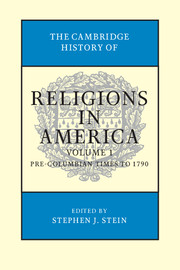Book contents
- Frontmatter
- Contents
- Contributors
- Editor's Introduction
- SECTION I BACKGROUND ON RELIGIOUS TRADITIONS – PRE-1500S
- SECTION II RELIGIONS IN THE POST-COLUMBIAN NEW WORLD – 1500–1680S
- SECTION III RELIGIOUS PATTERNS IN COLONIAL AMERICA – 1680S–1730S
- SECTION IV RELIGIOUS DIVERSITY IN BRITISH AMERICA – 1730S–1790
- 17 Religious Ferment among Eastern Algonquians and Their Neighbors in the Eighteenth Century
- 18 African Slave Religions, 1400–1790
- 19 Colonial Judaism
- 20 Roman Catholicism in the English North American Colonies, 1634–1776
- 21 Anglicanism and Its Discontents: Protestant Diversity and Disestablishment in British America
- 22 Protestant Evangelicalism in Eighteenth-Century America
- 23 Sectarian Communities: Religious Diversity in British America, 1730–1790
- 24 Liberal Religious Movements and the Enlightenment
- 25 Folk Magic and Religion in British North America
- SECTION V AMERICAN RELIGIONS IN THE EIGHTEENTH-CENTURY INTERNATIONAL CONTEXT
- SECTION VI THEMATIC ESSAYS
- Index
- References
17 - Religious Ferment among Eastern Algonquians and Their Neighbors in the Eighteenth Century
from SECTION IV - RELIGIOUS DIVERSITY IN BRITISH AMERICA – 1730S–1790
Published online by Cambridge University Press: 28 July 2012
- Frontmatter
- Contents
- Contributors
- Editor's Introduction
- SECTION I BACKGROUND ON RELIGIOUS TRADITIONS – PRE-1500S
- SECTION II RELIGIONS IN THE POST-COLUMBIAN NEW WORLD – 1500–1680S
- SECTION III RELIGIOUS PATTERNS IN COLONIAL AMERICA – 1680S–1730S
- SECTION IV RELIGIOUS DIVERSITY IN BRITISH AMERICA – 1730S–1790
- 17 Religious Ferment among Eastern Algonquians and Their Neighbors in the Eighteenth Century
- 18 African Slave Religions, 1400–1790
- 19 Colonial Judaism
- 20 Roman Catholicism in the English North American Colonies, 1634–1776
- 21 Anglicanism and Its Discontents: Protestant Diversity and Disestablishment in British America
- 22 Protestant Evangelicalism in Eighteenth-Century America
- 23 Sectarian Communities: Religious Diversity in British America, 1730–1790
- 24 Liberal Religious Movements and the Enlightenment
- 25 Folk Magic and Religion in British North America
- SECTION V AMERICAN RELIGIONS IN THE EIGHTEENTH-CENTURY INTERNATIONAL CONTEXT
- SECTION VI THEMATIC ESSAYS
- Index
- References
Summary
Riding together along the road between Philadelphia and Bethlehem, Pennsylvania, in 1760, two men – one a Euro-American Quaker and the other a Munsee Indian – had an opportunity to discuss religion, a topic of great interest to both individuals. The Quaker thought he could use the occasion “to say something” to the other man “about our Savior's words and good examples, when on earth.” The Munsee Indian, named Papoonahoal, listened as the Quaker, through an interpreter, inquired whether Papoonahoal “was disposed to hear such things.” Papoonahoal seemed interested in Quakerism; however, now was not the time for such talk. Papoonahoal's response indicates how Native Americans valued ceremony and honored the power of words. Rituals of preparation, he implied, were needed before broaching sacred matters. “Such words are very good,” Papoonahoal said,
and would be very acceptable at a fit time; such things are awful, and should be spoken of at a solemn time, for then the heart is soft, and they would enter into it, and not be lost. But when the heart is hard, they will not go into it, but fall off from the heart, and so are lost, and such words should not be lost; but at a fit time I would be glad to hear of those things.
The era from the 1730s to the 1790s was one of religious ferment within areas that were, or had been, part of the British North American colonies. The exchange on the Philadelphia road was just one of a multitude of encounters in an increasingly diverse world in which religion was often part of a “trade in culture.”
- Type
- Chapter
- Information
- The Cambridge History of Religions in America , pp. 347 - 368Publisher: Cambridge University PressPrint publication year: 2000

